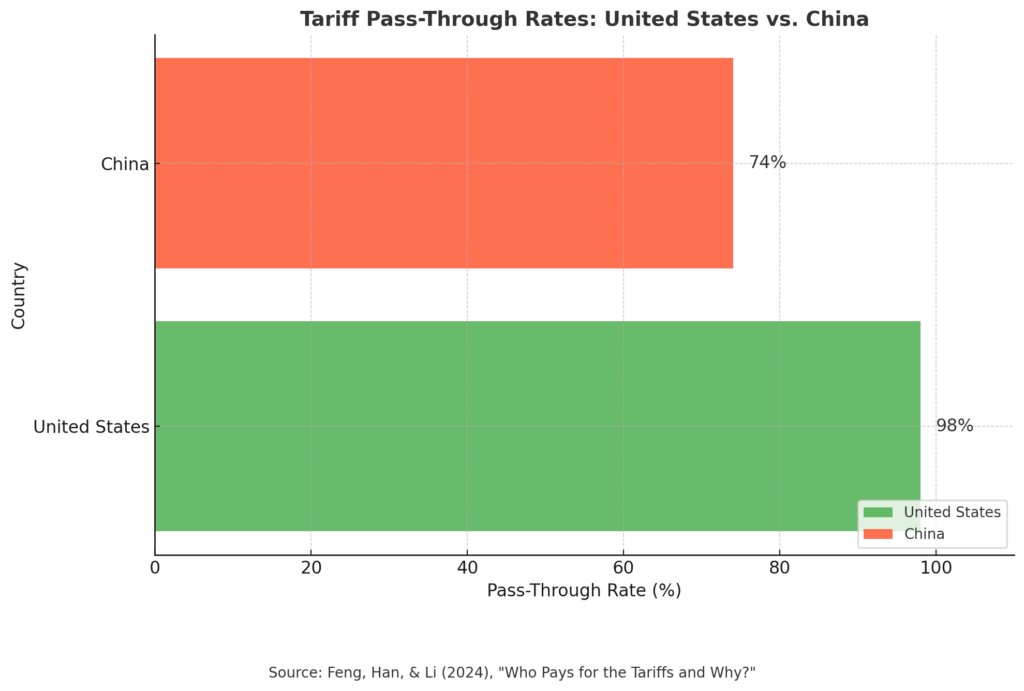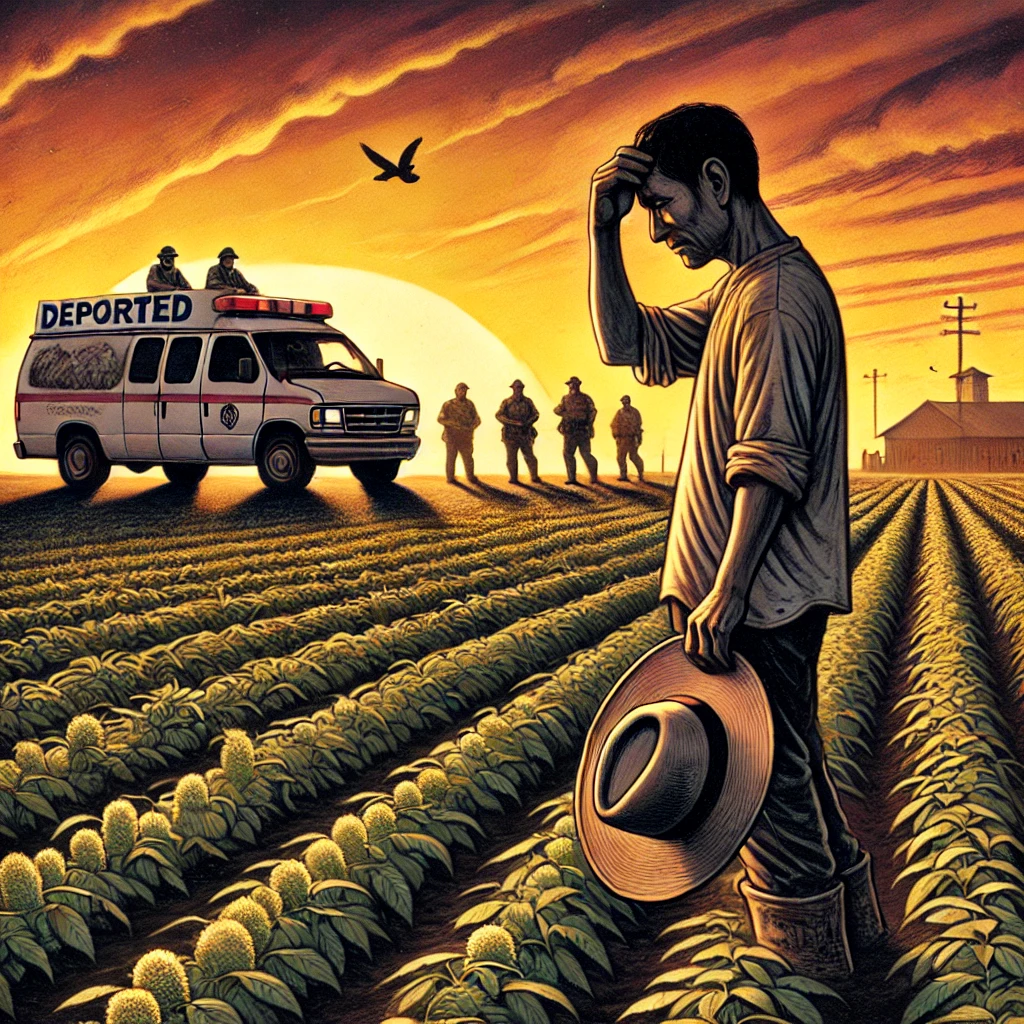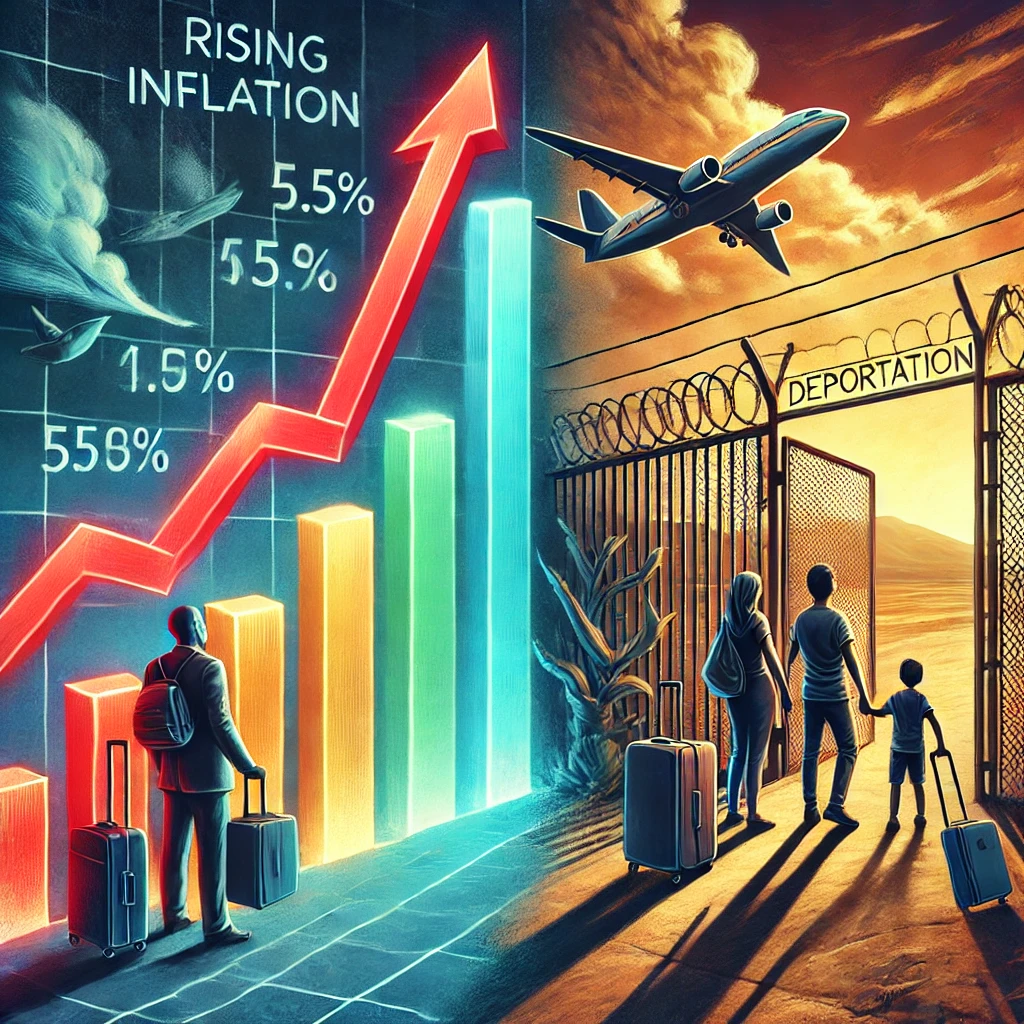Is Trump Going To Cause Price Increases With Tariffs & Deportation?
Key Takeaways
- Proposed Tariffs: Trump has suggested implementing a 10-20% blanket tariff on all imports, with higher rates of 60-100% on Chinese goods and 25% on Mexican and Canadian products.
- Economic Impact of Tariffs:
- Studies show that tariffs generally lead to increased prices for consumers and reduced economic output.
- The U.S. experienced a 98% tariff pass-through rate during the U.S.-China trade war, meaning American importers absorbed most of the costs.
- Deportation Effects:
- Mass deportations could potentially reduce GDP by 1.4% and significantly disrupt labor markets, particularly in sectors like agriculture and construction.
- It could lower median household income in mixed-status families by 47%, potentially increasing poverty rates.
- Public Opinion: Despite recent decreases, 64% of Americans still believe undocumented immigrants should be allowed to stay under certain conditions.
- Bipartisan Tariff Policies: Both Trump and Biden administrations have implemented or maintained tariffs, highlighting the complexity of trade policies.
- Economic Concerns: The proposed policies of increased tariffs and mass deportations raise significant concerns about potential negative impacts on the U.S. economy and American consumers.
You Got Jokes, Huh?
Fat jokes and references to one’s weight don’t change the truth or the facts. The data shows that tariffs and removing our most extensive farming harvesting base are damaging (York, 2024).
#Roland #Martin mentioned that Trump’s tariffs would cause the prices to increase by removing illegal undocumented migrants. Unfortunately, there are people making fun of Roland for stating a fact; in this post, I am going to go over proposed tariffs and removal of undocumented immigrants.
Proposed Tariffs

The bar chart above illustrates the tariff pass-through rates for the United States and China during the U.S.-China trade war. A pass-through rate indicates the extent to which the tariff cost is reflected in the prices paid by importers (Feng, Han, & Li, 2024).
Key Observations:
- United States: The pass-through rate is 98%, meaning U.S. importers absorbed nearly the entire cost of the tariffs, leading to higher import prices.
- China: The pass-through rate is 74%, indicating that Chinese importers experienced a lesser increase in import prices, with some of the tariff costs absorbed by exporters or offset through other adjustments.
Implications:
- For U.S. Importers and Consumers: The high pass-through rate suggests that tariffs led to increased costs for U.S. businesses importing goods from China, which likely resulted in higher prices for consumers.
- For Chinese Importers and Consumers: The lower pass-through rate implies that Chinese importers and consumers were less affected by price increases, as exporters may have reduced their prices to maintain competitiveness.
These findings highlight the asymmetric impact of tariffs between the two countries, with U.S. importers bearing a more substantial tariff cost burden than their Chinese counterparts.
On November 7, NBC New York reported that Trump proposed a blanket tariff of 10% – 20% on all imports (Richards & Kopack, 2024). 1
- 60% to 100% on goods brought in from China (Richards & Kopack, 2024).
- A 25% tariff on all products from Mexico and Canada (Meltzer, 2024).2
A 501(c) (3) nonprofit organization that researches and analyzes tax policies wrote a blog post in June by York (2024) finding that Tariffs would increase taxes by 3.6 billion dollars (Tax Foundation, 2024, Key takeaways section).
Instead of boosting domestic industries as intended, the tariffs often increased consumer costs, retaliatory measures from trading partners, and disruptions in global supply chains.Â
“Academic and governmental studies find the Trump-Biden tariffs have raised prices and reduced output and employment, negatively impacting the US economy.” (Tax Foundation, 2024, para. 1).3
My viewpoint on tariffs is that it is a desperate attempt to ignite something that is not there. Adding a point on how the Biden administration kept tariffs would have been a more balanced argument by Roland (Feng, Han, & Li, 2024). 4
Biden continued the tariff campaigns that Trump initiated (The White House, 2024); that is the truth.5 Who is thinking about the American people in an environment like the one we live in? Here is the video from Roland Martin discussing tariffs:
Why not mention anything about how Biden could have removed the tariffs? Again, I like some of Roland’s reporting; this is just constructive criticism. Roland didn’t lie, but he could give a more balanced argument in his commentary.
Despite comments on Roland Martins’s weight, Roland was telling the truth:
Tariffs are unsuitable for lower-income Americans and decrease after-tax income across all income groups. The critique of Roland would be better if they were based on something other than insults.
As I mentioned on my Twitter account, I am not that active as much; we have to watch the moves and not what politicians say because they are not to be trusted with just words but actions. Biden pardoned Hunter Biden recently, which was something he had lied about.
Do not forget that a significant negotiation is still taking place on January 15, 2025, by the International Longshoremen’s Association (ILA). We could see another strike, which would also cause disruptions (International Longshoremen’s Association, 2024). 6
Removal of Undocumented Immigrants

Undocumented workers are the dominant force for jobs Americans do not want to work7, and most Americans (64%) say undocumented immigrants should be able to stay (Pew Research, Krogstad & Mukherjee, 2024). 8
That last statistic is down from the previous years, where there was a 75% approval rate of immigrants. I don’t believe those committing crimes should be allowed to stay in America; however, if they are productive or waiting for work and not bothering anyone, let them stay.
- Mass deportations would cripple the U.S. economy and cause poverty, according to the Center for Migration Studies.
“Removing undocumented residents from mixed-status households would reduce median household income from $41,300 to $22,000, a drop of $19,300, or 47 percent, which would plunge millions of US families into poverty.” (Center for Migration Studies, 2017). 9
This is not a good look and would also reduce gross domestic product by 1.4%, stunting growth.
To ignore this data and resort to name-calling without countering with data is outrageous and shows you how much work has to be completed.
In closing, we must remain diligent and involved in the political process to spark change. I am concerned for the American people; both parties reveal things I know. What do I know? It will ultimately be up to the American people to turn things around; for freedmen, we always have our backs against the wall, and that is where we shine best.
Hopefully, this decision can be offset by some innovation or outlier that changes the trajectory of leadership decisions. What do you think about mass deportations? Share your thoughts below, and thanks for reading.
Note: The next update will be on the gender war in America and its impact on the black community.
References
- Richards, Z., & Kopack, S. (2024, November 25). Trump says he plans to enact new tariffs on Canada, China and Mexico on his first day in his office. NBC New York. https://www.nbcnewyork.com/news/politics/donald-trump/trump-says-he-plans-to-enact-new-tariffs-on-canada-china-and-mexico-on-his-first-day-in-his-office/5517832/ ↩︎
- Meltzer, J. P. (2024, December 3). Assessing Trump’s proposed 25% tariff on imports from Mexico and Canada. Brookings Institution. https://www.brookings.edu/articles/assessing-trumps-proposed-25-tariff-on-imports-from-mexico-and-canada/ ↩︎
- York, E. (2024, June 26). Tracking the economic impact of the Trump tariffs. Tax Foundation. https://taxfoundation.org/tariffs-trump-trade-war/ ↩︎
- Feng, C., Han, L., & Li, L. (2024). Who pays for the tariffs and why? A tale of two countries. Presented at Trade, Value Chains, and Financial Linkages in the Global Economy, Rome, Italy. Beihang University and University of Göttingen. ↩︎
- The White House. (2024, May 14). FACT SHEET: President Biden takes action to protect American workers and businesses from China’s unfair trade practices. https://www.whitehouse.gov/briefing-room/statements-releases/2024/05/14/fact-sheet-president-biden-takes-action-to-protect-american-workers-and-businesses-from-chinas-unfair-trade-practices/ ↩︎
- International Longshoremen’s Association. (2024, October 3). Joint statement regarding Master Contract. https://ilaunion.org/joint-statement-regarding-master-contract/ ↩︎
- Pew Research Center. (2020, June 10). A majority of Americans say immigrants mostly fill jobs U.S. citizens do not want. https://www.pewresearch.org/short-reads/2020/06/10/a-majority-of-americans-say-immigrants-mostly-fill-jobs-u-s-citizens-do-not-want/ ↩︎
- Pew Research Center. (2024, November 22). Most Americans say undocumented immigrants should be able to stay legally under certain conditions. https://www.pewresearch.org/short-reads/2024/11/22/most-americans-say-undocumented-immigrants-should-be-able-to-stay-legally-under-certain-conditions/ ↩︎
- Kerwin, D., Warren, R., & Nicholson, M. (2017). Mass deportations would impoverish US families and create immense social costs. Center for Migration Studies. https://cmsny.org/publications/mass-deportations-impoverish-us-families-create-immense-costs/ ↩︎



Leave a Reply